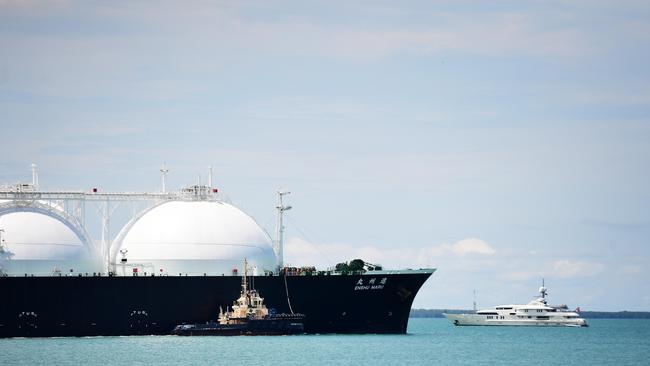Manufacturers want a say in gas agreement
Big east coast gas users have lobbied the federal government for manufacturers to be included in a heads of agreement with Queensland gas exporter.

Big east coast gas users have lobbied the federal government for manufacturers to be included in a heads of agreement with Queensland gas exporters to ensure sufficient supplies are available at affordable prices.
Ahead of the federal budget, the Morrison government is expected to call on big gas producers to extend a commitment to supply extra domestic east coast gas beyond 2020 to avoid shortages as tensions simmer over the high price of local supplies.
As part of that pact, The Australian understands several prominent gas users have held meetings with the government, asking to have a “seat at the table” to ensure the needs of the nation’s manufacturers are represented in the energy policy.
A heads of agreement with the three Queensland exporters — the Santos-led GLNG project, Origin Energy’s APLNG and Shell’s QCLNG — is due to expire in November but is set to be extended to ensure export restrictions are not activated under the Australian Domestic Gas Security Mechanism.
The agreement works by ensuring LNG exporters offer uncontracted gas to the domestic market in the event of a shortfall before it is shipped offshore to Asian buyers.
Manufacturers including Qenos, Orica and Incitec Pivot have been among critics of the gas industry on the east coast, complaining of problems striking long-term gas supply deals, which they argue have put the future of big manufacturing facilities under a cloud.
Federal Resources Minister Keith Pitt said the government was aware of manufacturers’ concerns over gas, which had been reflected in the heads of agreement.
“The government has made it clear how important a reliable gas supply is for our manufacturing sector and that this is a key component of our economic recovery from the COVID-19 pandemic,” Mr Pitt said.
“We have already taken measures to address industry concerns around gas supply, including through the heads of agreement, and will continue to consult extensively with industry to ensure future concerns are addressed.”
The Morrison government is weighing a final report from the National COVID-19 Coordination Commission manufacturing taskforce chaired by former Dow boss Andrew Liveris.
A draft proposal suggested a “gas-led” recovery involving guaranteeing gas volumes, opening new fields and building pipelines to halve the price of the fossil fuel to a $4 a gigajoule target.
The Australian Competition & Consumer Commission in August recommended the heads of agreement be extended beyond 2020 and should also strengthen requirements around price offers.
Manufacturing Australia, which counts Orora, Brickworks, CSR and Incitec Pivot as members, has been pressing for an export control trigger that can be activated both when gas prices are too high in addition to when a supply shortfall is forecast.
“If you have a heads of agreement around supply, you should absolutely include clear expectations around price,” Manufacturing Australia chief executive Ben Eade told The Australian.
“Without it, local customers will continue to be offered supply at unworkable or unsustainable prices.”
A review of the ADGSM in January by the Department of Industry, Innovation and Science noted calls for a price trigger were generally based on using either a set price or a price reflecting the relationship between domestic and international prices.
However, gas producers pushed back on the idea.
The Department of Industry was also cautious, noting prices would still be determined by market forces in the event the ADGSM is triggered, and its activation may not deliver a targeted price level.
Still, Mr Eade said pricing within the ADGSM needed to be addressed.
“It’s an area that clearly needs to be tightened up in both the heads of agreement and the Australian Domestic Gas Security Mechanism.
“More supply in and of itself is necessary but not sufficient. We need supply at internationally competitive prices.”
Manufacturers’ demands did not always reflect the reality of the market, JPMorgan said, while noting low spot prices made it difficult to spur new development of gas supplies.
“In the past month public calls for intervention in the domestic gas market have regained headlines, despite spot gas prices remaining low.
“These calls for intervention are occurring even though there has been no decline in gas supply compared to the prior year,” JPMorgan analyst Mark Busuttil said.
“More gas has been made available for the domestic market this year due to reduced demand from LNG exports.
“We believe current spot gas prices are insufficient to incentivise upstream development.”






To join the conversation, please log in. Don't have an account? Register
Join the conversation, you are commenting as Logout